December
Hibernating, reflecting, planning, celebrating with festive feasts and tucking into seafood galore, all at its splendid peak. Tom Hunt on what we can enjoy this month.
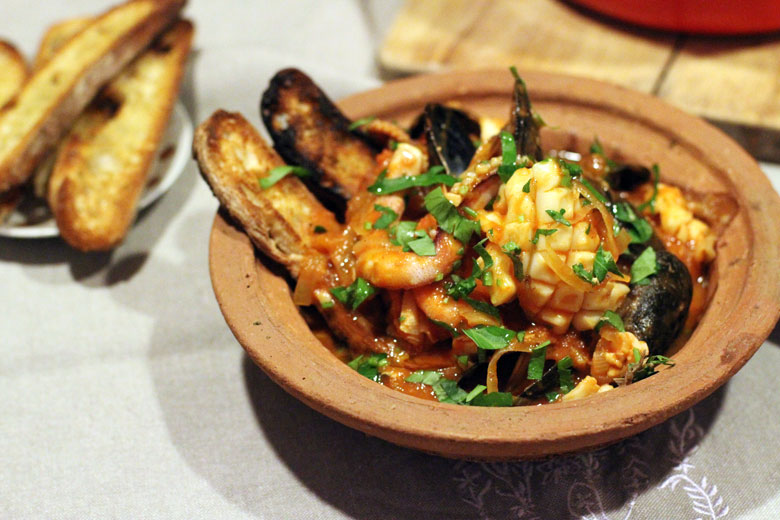
The solstice is a time of year shrouded in mystery that has been celebrated since the beginning of time. It marks the deepest depths of winter, a time of year I love, perfect for battening down the hatches and hibernating. A time for reflecting, learning and planning for the months ahead.
It is the shortest day of the year, with only nine hours of sunlight. It’s also the longest night – and I like to celebrate with a feast. And what better than fish for such an occasion, coming as it does just before meat-heavy Christmas.
As we’re celebrating, I like to pull out the big guns and serve pot-caught langoustine and lobster, with oysters as a starter – all plucked perfectly fresh from the cold water. Put the lobster in the freezer for half an hour, so that it becomes dormant, then cook it for 12-15 minutes per kilo in a large pot of ferociously boiling water. Allow it to cool while you cook the langoustines (also poetically named Dublin Bay prawns) for five minutes in the same pot. Serve a lobster split in two with half a dozen langoustine and a dozen shucked oysters as a generous starter for six people. All you need for a garnish is a wedge of lemon.
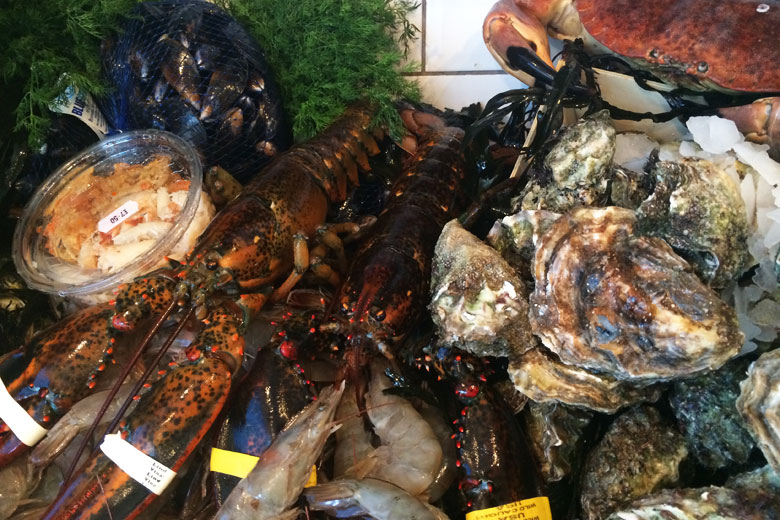
It seems to be a common misconception that the fields don’t have much to offer us at this time of year. But there are some stunning fruit and vegetables that we should use to the full: cauliflower, celeriac and Jerusalem artichokes are three of my favourites. Jerusalem artichokes make a dreamily smooth purée when boiled with potatoes and blended with butter and cream: a perfect accompaniment to a fillet of cod or hake seared in a pan.
Other winning British veg filling our shelves include beetroots, Brussels sprouts, celery, chicory, kale, kohlrabi, salsify, turnips and swede. All are nutritious, warming and can be cooked in so many exciting ways. For example, I like to serve my Brussels sprouts raw in a winter slaw, mixing the thinly sliced sprouts with segments of clementine, chilli flakes, seeds and olive oil. This salad goes really well with grilled oily fish such as sardines or mackerel. Buy butterflied fillets from your fishmonger and scorch them on a hot griddle, charring the skin, then serve on top of the salad with a splash of your favourite chilli sauce. Or, for a real winter warmer, bake wedges of chicory with slices of garlic and anchovies in double cream for 45 minutes in a low oven, then serve topped with scallops seared for just 30 seconds each side, doused in lemon.
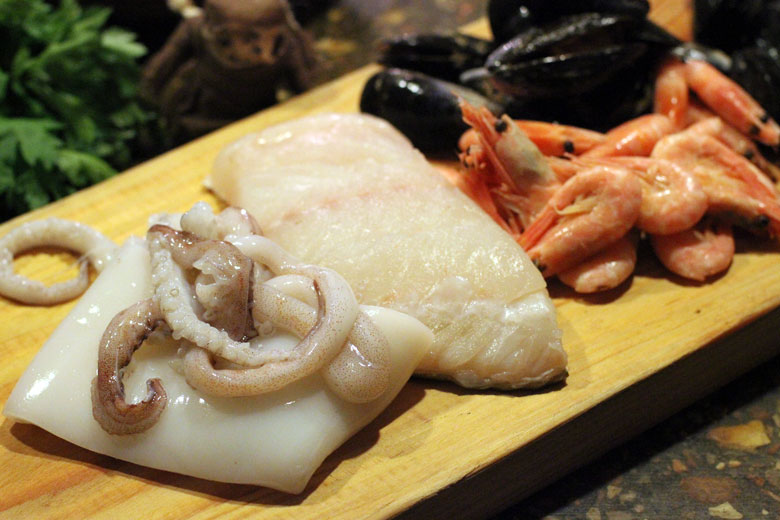
For my main recipe this month, I’ve chosen a bountiful Italian-style fish stew. It seems that every region of Italy has its own unique recipe: Ligurians on the south coast of northern Italy make a dish called buridda; one of Tuscany’s many vibrant fish stews is called cacciucco and traditionally contains five fish; and in the Marche they make the most famous fish stew in the whole of Italy, brodetto, adding white wine or vinegar to the base to give the tomato broth further acidity and depth.
I’m sure every village, or even every household, has its own unique recipe, but they all have one thing in common: they generally contain a variety of lesser-known fish that’s either by-catch or what you might call “bottom of the boat”. This is why I’ve called my recipe Forgotten fish stew. It reflects my “root to fruit” ethos of complete consumption perfectly, by making sure that none of the catch is wasted.
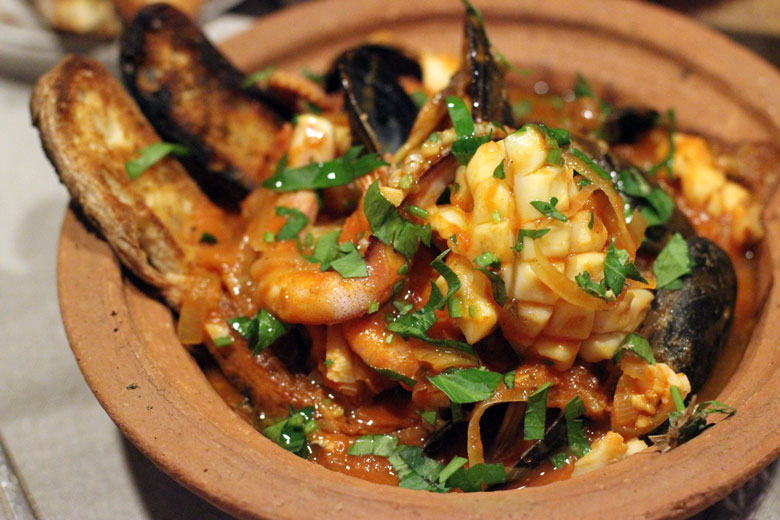
Forgotten fish stew
This stew is a stunning way to celebrate winter’s wealth of fresh seasonal fish in an easy-to-make one-pot wonder. By the way, the fish I’ve used in this recipe is only a suggestion. Use a variety of the freshest fish you can get hold of on the day.
Ingredients
Makes 4 generous portions
50ml extra virgin olive oil
2 medium onions, roughly sliced
4 cloves garlic, roughly chopped
Pinch saffron, lightly toasted in a dry pan
250ml white wine
500g passata
6 slices (ideally stale) sourdough bread
250g hake, pouting or white fish fillet, cut into large cubes
300g mussels, cleaned
250g (cleaned weight) calamari or squid, cut into 2-inch square pieces and scored, tentacles separated
150g cold-water prawns
2 tbsp parsley, roughly chopped
Extra virgin olive oil to serve
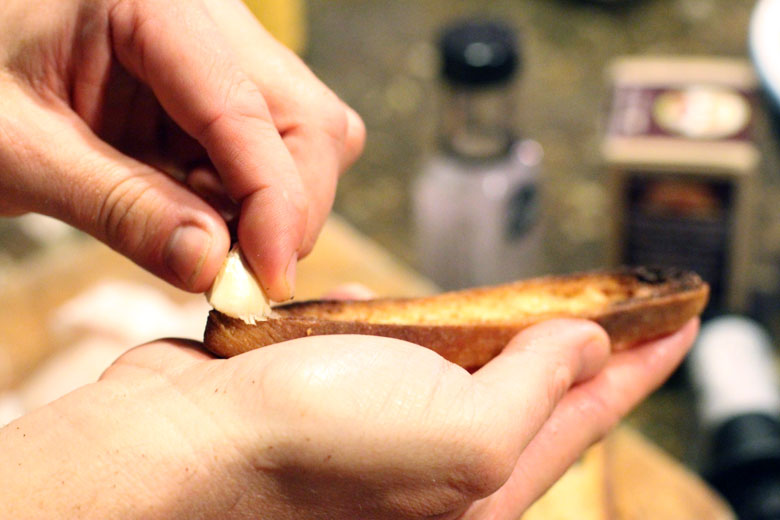
Method
In a large saucepan, heat the olive oil to a medium-low heat. Sauté the onions for 15 minutes, until they are soft, then add the garlic and sauté for a further two minutes. Add the wine and bring to the boil for a few minutes.
Toast the saffron in a dry pan for about a minute, being careful not to burn it. Add the wine and passata. Bring to a light simmer and boil for 10 minutes. Season the broth to taste and thin with a little water, if necessary, to give a thickish soup-like consistency.
When you’re ready to eat, lightly toast the stale bread, rub with a cut clove of garlic and season with salt. Place a piece in the bottom of each bowl.
Add the cubes of fish, the calamari/squid if you’re using it, and the mussels and prawns to the pan. Turn in the sauce and place the lid on top for 3-5 minutes. It is easy to overcook the fish so remove from the heat as soon as the mussels open. Remove from the heat, add the parsley and turn in the sauce once more. Serve generously on top of the toasted bread.
Tom Hunt is author of The Natural Cook: Eating the Seasons from Root to Fruit. He founded the Forgotten Feast, a campaign working on projects throughout the UK, to revive our cooking heritage and help reduce food waste and Poco, a festival café and award-winning restaurant in Bristol and (just opened) London’s Broadway Market. Click here to read his blog, Tom’s Feast.





